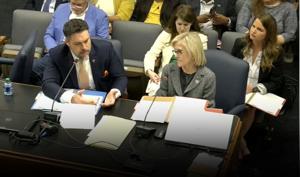News from the South - South Carolina News Feed
Week 10 Highlights Manning vs Lake City 2024
SUMMARY: In a thrilling matchup, top-ranked Manning faced Lake City in a closely contested game. Lake City has a history of tight matches, and this one was no different. Manning took a 12-6 lead before halftime with a spectacular kickoff return. After a Lake City touchdown tied the game, Manning’s Irvin Mayor scored again, putting them ahead 18-12. Lake City responded with another touchdown, making it 18-18 as the game headed into the fourth quarter. Manning ultimately secured the win with a late score from Bertran. Despite the loss, Lake City remains competitive with a .500 record in region play.

To watch the full EndZone, click here: https://wpde.com/sports/friday-night-rivals/game-replays/socastee-vs-st-james-friday-night-rivals-hs-football-game-of-the-week#
_______________
Stay up to date with our social media:
WPDE on Facebook: https://www.facebook.com/WPDEABC15/
WPDE on Twitter: https://twitter.com/wpdeabc15
Subscribe to WPDE on YouTube: https://www.youtube.com/channel/UCn0sxo5Ocp8eSFqr9F1URpg/?sub_confirmation=1
Daily News Playlist:
https://www.youtube.com/playlist?list=PLCFE982C7D59E70C1
For more information, visit https://wpde.com/
Have a news tip? Send it directly to us:
Email us: abc15news@wpde.com
Call the Newsroom: 843.487.3001
WPDE is a SC based station and an ABC Television affiliate owned and operated by Sinclair Broadcast Group. WWMB is a SC based station and a CW Television affiliate owned and operated by Howard Stirk Holdings and receives certain services from an affiliation of Sinclair Broadcast Group.
#WPDE #ABC15News #ABC15 #WPDE15 #MyrtleBeach
News from the South - South Carolina News Feed
Trump marks his first 100 days in office with a rally in Michigan, a state rocked by his tariffs
SUMMARY: President Donald Trump is holding a rally in Michigan to mark the first 100 days of his second term, his largest public event since returning to the White House. His administration has implemented strict immigration policies, aggressive trade tariffs, and government workforce cuts, prompting mixed public approval. Michigan, a key battleground state, has been negatively impacted by Trump’s tariffs on cars and auto parts, leading to rising unemployment and production halts. Despite controversy, Trump plans to sign an executive order easing some tariffs. His visit includes an announcement with Governor Gretchen Whitmer, who is cautiously cooperating despite their differences.
The post Trump marks his first 100 days in office with a rally in Michigan, a state rocked by his tariffs appeared first on www.abccolumbia.com
Note: The following A.I. based commentary is not part of the original article, reproduced above, but is offered in the hopes that it will promote greater media literacy and critical thinking, by making any potential bias more visible to the reader –Staff Editor.
Political Bias Rating: Center-Right
This article presents a generally neutral overview of President Trump’s first 100 days in office, focusing on his policies, actions, and their impact on Michigan. While it acknowledges the contentious nature of his trade tariffs and their economic impact on Michigan, it also features perspectives that critique his administration’s efforts, such as Max Stier’s comments about government destruction and Bernie Porn’s assessment of Trump’s confrontational approach. The inclusion of both administration officials and Trump’s critics helps maintain balance, though the overall tone, especially in discussing his policies, leans slightly towards a critical yet factual presentation typical of Center-Right analyses.
News from the South - North Carolina News Feed
State Health Plan in debt, employee premiums to dramatically rise
The State Health Plan is deeply in debt. To get out of the red, the 750,000 employees who receive coverage will experience something many were hoping to avoid: the first significant premium increase in nearly a decade.
It’s part of the strategy from Brad Briner, North Carolina’s treasurer, to pay off a $507 million shortfall the State Health Plan has accrued due to dramatic increases in the cost of health coverage — a deficit which is projected to grow to $1.4 billion by 2027.
State employees will face a minimum $20 increase in monthly premiums for their health insurance starting in 2026. Those premiums could reach an additional $110 per month. Deductibles and co-pays will increase as well.
The premium hike will affect even the lowest-paid state employees at a time when many North Carolina agencies face staffing shortages and recruitment challenges.
It all comes after a potential problem was foreshadowed last year by former Treasurer Dale Folwell, who said the State Health Plan — which covers about 8% of North Carolina residents who have medical coverage — may be unable to stay afloat by fall 2026 due to the aforementioned rising costs in care. North Carolina ranks No. 1 in health care costs by state and has the most expensive health care in the nation, according to Forbes.
But Briner doesn’t intend to let the State Health Plan drown in debt.
Paying the price
Folwell’s solution was to have the General Assembly open its wallet.
However, Briner’s plan requires state employees to open theirs as well.
The base premium for state employees will rise from $25 to $45 monthly next year. Increases will reach $110 for the highest-paid employees. Deductibles will increase anywhere from $3,000 to $9,000. Co-pays will rise between $20 and $45 per visit.
All together, it will bring $100 million back into the plan, Briner said.
But he isn’t stopping there. He asked for another $100 million from the legislature, and lawmakers delivered in this year’s proposed Senate budget.

“The Senate gave us everything we hoped they would give us, and we are really, really appreciative that they found the money in a year that everybody knows is really tight,” Briner told Carolina Public Press. “Their number one priority is not the State Health Plan right now. It’s not the State Pension Plan. It is rebuilding Western North Carolina, and we certainly understand that.”
The $100 million could be a boon — provided the House approves the budget and it crosses Gov. Josh Stein’s desk in one piece.
Additionally, $25 million of it is earmarked to bring weight-loss drugs like Ozempic and Mounjaro back into the plan.
In 2023, as a cost-cutting measure, the plan stopped covering the blockbuster drugs. Now, those drugs will be covered once again for state employees who qualify.
“I tend to think about drugs — the useful ones — in one of two ways,” Briner explained. “Either they have a profound impact on a small population or they have a small impact on a profound population. It’s rare that you have a medicine that is both profound in impact and enormous in population, and (these drugs) are that.”
State Health Plan increase ‘significantly high’
But the premium increase is a disturbing development for state employees.
Low salaries are a problem across agencies. At the NC Forest Service, for example, there are 100 vacancies, due in part to a lack of competitive pay. Now, those who chose to work for the service will face higher costs for health insurance.
And it’s not just firefighters. Teachers, too, have been dealing with pay issues.
“We are against any increase to the premiums for public school employees because we know that this increase will take more money out of our educators’ paychecks in a state where our educators are very much underpaid,” said Tamika Walker Kelly, president of the North Carolina Association of Educators, which represents public school workers across the state. “We know that it could be one of the many things that continues to drive our educators out of a profession in a time where we are facing an educator shortage here in North Carolina.”
Recently, the North Carolina Public Service Workers Union held a statewide protest over the price hikes, which they characterized as “attacks on the State Health Plan.”
“As public workers,” union leader Charles Owens said in a statement, “we aren’t being taken care of by our lawmakers.”
While Briner frames the monthly increases as a necessary measure to save the health plan, Walker Kelly sees it as a financial burden on those who receive coverage.
“A $20 increase is significantly high, especially when we are talking about educators who have not seen a significant increase in their base pay from the state of North Carolina in quite some time,” she said. “Twenty dollars is whether or not I can put gas in my car to take myself to and from work.
“It may seem like a relatively low number on paper, but it provides significant challenges to the economic well-being of our educators throughout the state.”
This article first appeared on Carolina Public Press and is republished here under a Creative Commons Attribution-NoDerivatives 4.0 International License.![]()
The post State Health Plan in debt, employee premiums to dramatically rise appeared first on carolinapublicpress.org
Note: The following A.I. based commentary is not part of the original article, reproduced above, but is offered in the hopes that it will promote greater media literacy and critical thinking, by making any potential bias more visible to the reader –Staff Editor.
Political Bias Rating: Center-Left
The content presents a critical view of premium increases impacting state employees, emphasizing the financial burden on low-paid workers like educators and public service employees. It highlights concerns from union leaders and employee representatives, which aligns with a center-left perspective focused on labor rights and social welfare. However, it also fairly presents the fiscal challenges and responses from state officials, reflecting a balanced approach without extreme partisanship. The article advocates for protecting workers’ economic well-being while acknowledging governmental budget constraints, typical of a center-left stance.
News from the South - North Carolina News Feed
Appointment power for election boards remains with NC governor
For the fifth time in a decade, a court has decided that the legislature cannot remove a governor’s power to appoint election board members. During a hearing last week in Wake County Superior Court, a three-judge panel ruled that a law attempting to give the governor’s elections appointment power to the state auditor would make it impossible for the chief executive to do their job as the North Carolina Constitution requires.
Currently, county election boards are comprised of five members, with two each coming from the Democratic and Republican parties. The governor gets to appoint the chair.
The governor also chooses all State Board of Elections members.
Ultimately, those appointment powers can give the governor, and by extension their political party, tremendous influence on election matters.
Since former Democratic Gov. Roy Cooper won office in 2016, Republican lawmakers have made numerous attempts to take that deciding vote away.
Each time, they’ve fallen short.
In this latest attempt, the Republican defendants — Senate leader Phil Berger, House Speaker Destin Hall and State Auditor Dave Boliek — said they will appeal the ruling. While the players are different this time around, the case will undoubtedly end up in the hands of the state Supreme Court.
The state’s highest court has seen this play out before. But that was in 2017 when Democrats held the majority and narrowly struck down a separate attempt.
Eight years later, things have changed. Republicans hold a 5-2 advantage. That could make all the difference.
Appointment power and executive ‘hopscotch’
If courts ultimately side with the legislature, North Carolina will be the first state that grants any elections power to a state auditor.
Usually, that duty goes to a secretary of state, if anyone, but a Democrat won that office in the most recent election.
Ann Webb, the policy director for Common Cause North Carolina, hopes courts see through the “partisanship” of legislators.
But partisanship isn’t necessarily unconstitutional, as legislative attorney Matthew Tilley noted during arguments before the Wake County court.
In response, Wake County Superior Court Judge Lisa Hamilton said if they allowed this maneuver, there would be nothing stopping a future legislature from shifting election appointment power to another executive office, like the treasurer or agricultural commissioner, to ensure their party maintained control.
“I’m hoping that we’re not going to hopscotch around all nine members of the Council of State until we finally land on the one that would be appropriate,” Hamilton said during the hearing.
The court’s order reflected this concern.
While the General Assembly is allowed to assign duties to members of the Council of State, that right stops where the governor’s constitutional duty to faithfully execute the laws begins, the court ruled. The faithful execution of the laws is not a shared duty among all Council of State members, they continued.
Partisanship takes center stage
The final battle is set for the NC Supreme Court.
There, the major dynamic will be “partisan perspectives and allegiance versus constitutional principles,” Catawba College political science professor Michael Bitzer said.
“I think the expectation is that partisanship will be a determinative factor,” he said. “Whether it’s clearly enunciated in an opinion, I think we’ll just have to wait and see.”
Webb agrees. The state Supreme Court has shown a willingness to act in partisan ways, particularly when it comes to giving the legislature power, she said.
“It’s going to be very interesting to watch whether the state Supreme Court is willing to overturn its own precedent or twist the interpretation of its own precedent to allow that (power shift) to happen.”
North Carolina doesn’t have a particularly powerful governor, but that position does come with some fundamental executive power, Webb continued.
“If that gets dissolved piece by piece by the legislature, then we end up with a false pretense of an executive branch, and that’s not how it’s supposed to work and that’s not how voters assume it’s going to work,” she said.
Legislative leaders haven’t exactly shied away from the partisan angle.
In a statement on social media after the Wake County ruling, Hall, the House Speaker, said the Democratic-controlled State Board runs elections like its operating in “a banana republic, making up the rules as it goes.”
Pat Gannon, a spokesman for the State Board of Elections, objected to the characterization.
“These accusations about the bipartisan-run elections in our state are unfortunate and unfounded. In accordance with state and federal law, North Carolina’s voter rolls are maintained through careful processes that protect our elections and the rights of the voters,” he said in a statement to Carolina Public Press.
If the sixth time’s not the charm, Webb hopes legislators will finally stop. Or, at least, take the Democratic route in attaining appointment power: winning gubernatorial elections.
This article first appeared on Carolina Public Press and is republished here under a Creative Commons Attribution-NoDerivatives 4.0 International License.![]()
The post Appointment power for election boards remains with NC governor appeared first on carolinapublicpress.org
Note: The following A.I. based commentary is not part of the original article, reproduced above, but is offered in the hopes that it will promote greater media literacy and critical thinking, by making any potential bias more visible to the reader –Staff Editor.
Political Bias Rating: Center-Left
The content primarily reflects a Center-Left bias due to its focus on the implications of legislative actions concerning electoral processes in North Carolina, highlighting the tensions between Republican lawmakers and the Democratic governor. It emphasizes concerns about partisanship and the influence of political parties on election integrity, while featuring perspectives from advocacy groups like Common Cause, which are generally aligned with progressive values. The content presents legal arguments that defend the governor’s authority in a manner that leans towards retaining Democratic influence in election matters. Overall, the tone suggests a greater concern for maintaining checks on legislative power than for advocating any specific partisan agenda.
-

 News from the South - Missouri News Feed3 days ago
News from the South - Missouri News Feed3 days agoMissouri lawmakers on the cusp of legalizing housing discrimination
-

 Mississippi Today2 days ago
Mississippi Today2 days agoDerrick Simmons: Monday’s Confederate Memorial Day recognition is awful for Mississippians
-

 Mississippi Today5 days ago
Mississippi Today5 days agoStruggling water, sewer systems impose ‘astronomic’ rate hikes
-

 News from the South - West Virginia News Feed5 days ago
News from the South - West Virginia News Feed5 days agoIs West Virginia — and the rest of the country — prepared to care for our seniors?
-

 Mississippi Today5 days ago
Mississippi Today5 days agoParents, providers urge use of unspent TANF for child care
-

 News from the South - Arkansas News Feed7 days ago
News from the South - Arkansas News Feed7 days agoOp-Ed: Another dismal year for ranked-choice voting | Opinion
-

 News from the South - Florida News Feed4 days ago
News from the South - Florida News Feed4 days agoFlorida woman accused of setting fires during burn ban
-

 News from the South - Louisiana News Feed5 days ago
News from the South - Louisiana News Feed5 days agoTaxes on vapes and smokeless tobacco advance through committee | Louisiana











































